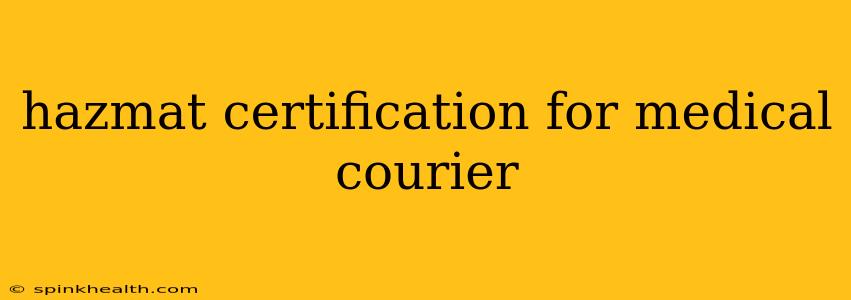Hazmat Certification for Medical Couriers: Navigating the Complexities of Dangerous Goods Transportation
The world of medical couriers is a fast-paced, high-stakes environment. These professionals are entrusted with transporting vital medical supplies, specimens, and pharmaceuticals – some of which might be classified as hazardous materials (hazmat). Understanding and adhering to hazmat regulations is not just crucial for compliance; it's essential for ensuring public safety and preventing potentially catastrophic accidents. This journey into the world of hazmat certification for medical couriers will unravel the complexities, clarifying the requirements and highlighting the importance of this crucial qualification.
What is Hazmat Certification?
Imagine this: you're a medical courier responsible for delivering a package containing infectious substances to a lab. Without proper hazmat training, you risk exposure to dangerous pathogens, and could unknowingly spread a disease. Hazmat certification is the answer to this critical issue. It's a formal training program that equips individuals with the knowledge and skills to safely handle, package, and transport dangerous goods. This training isn't just about following rules – it's about understanding why these rules exist and how they protect everyone involved in the transportation process. The certification demonstrates competence, ensuring that these vital materials reach their destination safely and legally.
Why is Hazmat Certification Important for Medical Couriers?
The transportation of medical materials often involves substances classified as hazardous under Department of Transportation (DOT) regulations. These substances range from infectious substances and diagnostic specimens to pharmaceuticals and radioactive materials. Improper handling can have severe consequences:
- Public Health Risks: Leaking infectious substances can lead to outbreaks and widespread illness.
- Environmental Hazards: Improper disposal or accidental spills can contaminate the environment.
- Legal Penalties: Non-compliance with hazmat regulations results in hefty fines and potential legal repercussions.
- Personal Safety: Incorrect handling can expose couriers and others to significant health risks.
What are the Different Types of Hazmat Training for Medical Couriers?
The specific type of hazmat training needed will depend on the types of hazardous materials being transported. Some common training areas include:
- General Awareness/Safety Training: This foundational training introduces basic hazmat concepts, regulations, and safety procedures. It's a good starting point for all medical couriers.
- Function-Specific Training: This training focuses on the specific tasks involved in handling, packaging, and transporting particular types of hazmat, such as infectious substances or radioactive materials.
- Emergency Response Training: This training equips couriers with the knowledge and skills to handle hazmat incidents, including spills, leaks, and accidents.
How Do I Obtain Hazmat Certification?
Obtaining hazmat certification usually involves completing a training course from a DOT-approved provider. These courses cover the relevant regulations, safety procedures, and emergency response protocols. Upon successful completion of the course and any required testing, a certificate is issued. It's crucial to choose a reputable training provider who is well-versed in the specific requirements for transporting medical materials.
What are the Renewal Requirements for Hazmat Certification?
Hazmat certification often requires renewal after a certain period, typically every few years. The specific requirements for renewal will vary depending on the training provider and the type of certification received. Keeping track of renewal deadlines is crucial to maintain compliance.
What are the Specific Hazmat Regulations for Medical Couriers?
Medical couriers must be intimately familiar with the DOT regulations governing the transportation of hazardous materials. This includes understanding:
- Packaging Requirements: Proper packaging is crucial to prevent leaks and spills.
- Labeling and Marking: Correct labeling and marking ensure that hazardous materials are clearly identified.
- Shipping Papers: Accurate shipping papers are required for all shipments of hazardous materials.
- Emergency Response Information: Knowing how to respond in case of an emergency is critical.
By understanding and adhering to these regulations, medical couriers play a vital role in ensuring the safe and efficient transportation of life-saving medical supplies. This commitment to safety protects not only the couriers themselves but also the public and the environment. Hazmat certification is an investment in safety, compliance, and professional excellence.

